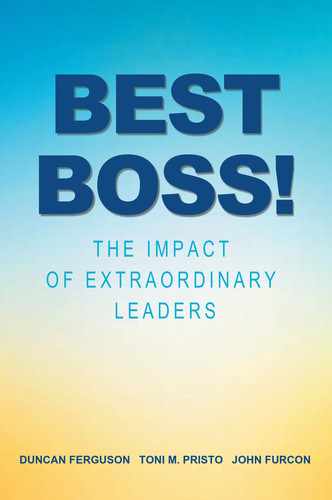2000 “Annual Report.” Fairfield, CT: General Electric Company. 2001. https://annualreports.com/HostedData/AnnualReportArchive/g/NYSE_GE_2000.pdf
Abbajay, M. September 7, 2018. “The Negative Health Consequences of a Bad Boss.” Harvard Business Review, Retrieved from https://hbr.org/2018/09/what-to-do-when-you-have-a-bad-boss
Alterman, T., R. Tsai, J. Ju, and K. Kelly. January 15, 2019. “Lack of Trust in a Manager can cause Cardiovascular Disease.” International Journal of Environmental Research and Public Health, Retrieved from IJERPH | Free Full-Text | Trust in the Work Environment and Cardiovascular Disease Risk: Findings from the Gallup-Sharecare Well-Being Index (mdpi.com)
Alvero, A.M., Buckland, B.R., and Austin, 2001. “An Objective Review of the Effectiveness and Essential Characteristics of Performance Feedback in Organizational Settings. (1985–1998).” Journal of Organizational Behavior Management 21, no 1, 3–29, http://doi.org//10.1300/J075v21n01_02
Anderson, J., and D.A. Level. July 1980. “The Impact of Certain Types of Downward Communication on Job Performance.” Journal of Business Communication 17, no. 4, 51–59. http://doi.org//10.1177/002194368001700405
Balcazar, F.E., M.K. Shupert, A.C. Daniels, PhD., T.C. Mawhinney, PhD., and B.L. Hopkins. 1989. “An Objective Review and Analysis of Ten Years.” Journal of Organizational Behavior Management 10, no. 1, 7–37, http://doi.org//10.1300/J075v10n01_02
Bower, J.L., and L.S. Paine, L.S. 2017. “The Error at the Heart of Corporate Leadership.” Harvard Business Review. Reprint 1703B, Published in HBR May-June 2017, pp. 2–12.
Brooks, M., J. Stark, and S. Caverhill. 2004. Your Leadership Legacy: The Difference You Make in People’s Lives. Berrett-Koehler Publishers.
Business Roundtable. August, 2019. “Business Roundtable Redefines the Purpose of a Corporation to ‘Promote and Economy that Serves All Americans.’” Press Release retrieved from https://businessroundtable.org/business-roundtable-redefines-the-purpose-of-a-corporation-to-promote-an-economy-that-serves-all-americans
Carlson, D.S., M. Ferguson, P. Perrewé, and D. Whitten. November 20, 2011. “The Fallout on Family Members and Subordinates stemming from an Abusive Supervisor.” Personnel Psychology. Retrieved from https://onlinelibrary.wiley.com/doi/abs/10.1111/j.1744-6570.2011.01232.x
Charan, R., S.J. Drotter, and J. Noel. 2011. The Leadership Pipeline: How to Build the Leadership-Powered Company. San Francisco: Jossey-Bass.
Csikszentmihalyi, M. 1990. Flow: The Psychology of Optimal Experience. New York, NY: Harper and Row.
Curtin, M. 2019. “Empowering and Engaging Employees By Listening to Them.” Inc. Retrieved from https://inc.com/melanie-curtin/employees-who-feel-heard-are-46x-more-likely-to-feel-empowered-to-do-their-best-work.html
Deci, E.L., and R.M. Ryan. February 14, 2008. “Facilitating Optimal Motivation and Psychological Well-Being Across Life’s Domains.” Canadian Psychology 49, no. 1.
de Geus, A. 1997. The Living Company. Boston, Mass: Harvard Business School Press.
Dweck, C. 2016. Mindset: The New Psychology of Success. New York, NY: Ballentine Books.
Friedman, M. September 13, 1970. “The Social Responsibility of Business Is to Increase Its Profits.” The New York Times Magazine, pp. 122–126.
Gallup, Inc. 2017. State of the American Workplace. Washington, DC.
Gallup, Inc. 2017. “An In Depth Look at what Characterizes Great Managers.” Retrieved from The State of the American Manager.
Gallup, Inc. 2020. State of the American Workplace. Washington, DC.
Garelli, S. 2021. “Why you Will Probably Live Longer than Most Big Companies.” https://imd.org/research-knowledge/articles/why-you-will-probably-livelonger-than-most-bigcompanies/#:~:text=A%20recent%20study%20by%20McKinsey,S%26P%20500%20will%20have%20disappeared (accessed February 5, 2021).
Gladwell, M. 2018. Outliers: The Story of Success. New York, NY: Little, Brown & Co.
Greenleaf, R.K. 1970. The Servant as Leader. Cambridge, Mass: Center for Applied Studies.
Harter, J., and A. Mann. 2017. “Common Philosophies of Highly Engaged Corporations.” Gallup, Retrieved from https://gallup.com/workplace/236366/right-culture-not-employee-satisfaction.aspx
Hogan Assessments Systems, Inc. 2014. “Stress Is Killing You.” Retrieved from https://hoganassessments.com/wp-content/uploads/2014/08/Stress_Health_eBook_Final.pdf
Investopedia. 2020. “Agency Theory.” Last modified January 27, 2021. https://investopedia.com/terms/a/agencytheory.asp
Kilts, J. 2007. Doing What Matters: How to Get Results That Make a Difference - The Revolutionary Old-School Approach. New York, NY: Crown Publishing Group.
Kim, D. 1993. “The Link Between Individual and Organizational Learning.” MIT Sloan Management Review, https://news.stanford.edu/2019/09/30/embrace-struggle-education-professor-challenges-common-beliefs-teaching-learning/
Korkki, P. April 23, 2011. “The Shifting Definition of Worker Loyalty.” New York Times, https://nytimes.com/2011/04/24/jobs/24search.html
Lazear, E., and K. Shaw. 2012. “The Value of Bosses.” National Bureau of Economic Research, Retrieved from https://nber.org/system/files/working_papers/w18317/w18317.pdf
Maslow, A. 1943. “A Theory of Human Motivation.” Psychological Review 50, no. 4, 370–396. http://doi.org//10.1037/h0054346
Mayo, E. 1945. Social Problems of an Industrial Civilization. Boston: Graduate School of Business Administration, Harvard University.
McGregor, D. 1960. The Human Side of Enterprise. New York, NY: McGraw-Hill. Pink, D. 2009. Drive: The Surprising Truth About What Motivates Us. New York, NY: Riverhead Books.
Schwantes, M. September 7, 2018. “Toxic Bosses can Impact Your Health.” Inc., Retrieved from https://inc.com/marcel-schwantes/research-says-working-for-these-4-types-of-toxic-bosses-can-ruin-your-health.html
Seppala, E., and K. Cameron. December 01, 2015. “The Effects of Positive Practices on Organizational Effectiveness.” Harvard Business Review, Retrieved from Proof That Positive Work Cultures Are More Productive (hbr.org).
Spears, L.C. 2010. “Character and Servant Leadership: Ten Characteristics of Effective, Caring Leaders.” The Journal of Virtues & Leadership 1, no. 1, 25–30. https://regent.edu/wp-content/uploads/2020/12/Spears_Final.pdf
Spector, C. 2019. “‘Embrace the Struggle’: Stanford Education Professor Challenges Common Beliefs about Teaching and Learning.” Stanford News, September 30, 2019. https://news.stanford.edu/2019/09/30/embrace-struggle-education-professor-challenges-common-beliefs-teaching-learning/
Zenger, J., and F. Joseph. January 15, 2014. “Your Employees Want the Negative Feedback you Hate to Give.” Harvard Business Review. https://hbr.org/2014/01/your-employees-want-the-negative-feedback-you-hate-to-give
